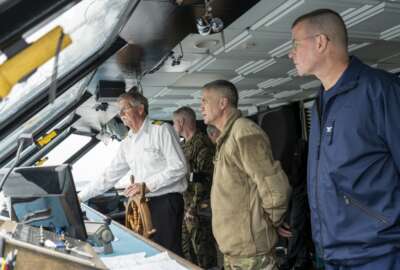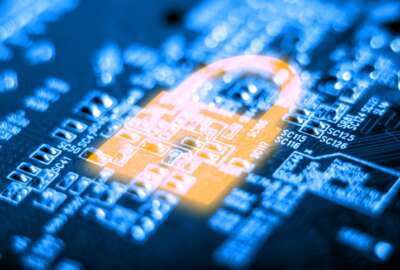Maritime defense agencies view cybersecurity with new sense of urgency
Cybersecurity will need to become a central focus for the Coast Guard and Navy as new war capabilities develop, military officials say.
The Department of Defense’s maritime agencies are making strides to have cybersecurity become a part of their culture.
Military officials at the Sea Air Space conference said new technology will permanently change the war landscape in the next couple decades. As a result, cybersecurity will become a focal point for not only the Coast Guard and Navy, but also the civilian agencies and industries that DoD protects.
“We’re talking about technology being used in many different ways that we traditionally in the 20th century didn’t use. It was all hardware. It was all about tonnage. It was all about how fast and far something can fly and hit and how big it’s going to explode. That’s not the world we’re living in right now,” said Vice Admiral Jeffrey Trussler, deputy chief of naval operations for information warfare, as part of Federal Monthly Insights — Cybersecurity (and aggregating cyber-related data). “It’s a new world. We have to change the way we think in our culture.”
From a defense standpoint, the long list of new technologies — including unmanned systems, artificial intelligence and 5G — means there are more vulnerabilities for DoD to address. Large volumes of oceanographic data or acoustic data in the Navy, for example, have invited a heightened need for AI and machine learning.
But services shouldn’t just focus on securing their own cyber operations, Trussler said.
“What they’re really going to go after is that critical infrastructure that none of the government owns,” Trussler said on Federal Drive with Tom Temin. “They don’t have to get those big, pointy-end fleet assets when they can go to Vice Admiral Skubic’s Defense Logistics Agency and disrupt that supply line of things we can’t operate.”
The Coast Guard recently announced a renewed version of its Cyber Strategic Outlook, which outlined maritime transportation as one of its three main lines of effort. This area is especially important, said Rear Admiral Mike Ryan, commander of the Coast Guard’s Cyber Command, because over 90% of U.S. commodities arrive by sea, making up $5.6 trillion of economic activity every year.
“It’s really a vested terrain for the Coast Guard as both a regulatory agency and really a steward for the maritime community, to help that segment of our industrial base to raise their game in the cybersecurity arena,” Ryan said. “We can defend the DoD all we want and preserve our vital military capabilities. That’s all well and good. But like Colonial Pipeline, if the underpinnings of our nation are attacked, that’s as equally disabling as if our military power cannot be projected.”
Just this year, nearly $18 million in grants — handled by the Coast Guard and the Federal Emergency Management Agency — have gone toward 16 different port security projects, Ryan said.
Once cybersecurity measures are implemented, services should embrace partnerships with creative people who can think like the adversary, Trussler said. These are people who can test the strength of DoD cybersecurity, and can train services on how to react when their systems are hit.
In the Coast Guard, partnerships with other agencies and industry partners have spawned an environment where cyber teams can work together to develop and test new capabilities.
“When they have a chance to operate in an exercise venue, with their service cyber component brethren, with a number of members of industry and really the interagency stewards, they just relish those opportunities,” Ryan said. “That’s not top-down driven, that really is just the bubble-up environment that I think our workforce brings to bear each and every day that we just give them maneuver space.”
Copyright © 2025 Federal News Network. All rights reserved. This website is not intended for users located within the European Economic Area.






